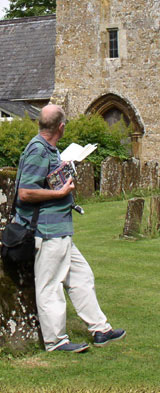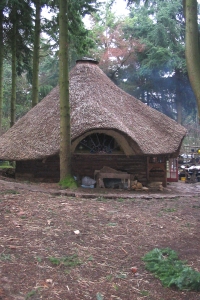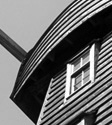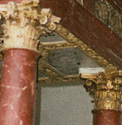 |
 |

Subject: Tinker's Bubble
Journal: The Financial Times Date: March 1995 Author: Clive Fewins No man made the land: it is the original inheritance of the whole species The land of every country belongs to the people of that country. I will arise and go now, and go to Innisfree,
You might think the residents of Tinker’s Bubble, the small community living in a sustainable fashion on land they
own on the slopes of Ham Hill in Somerset, would have some apposite lines like these, from John Stuart Mill and
W. B. Yeats adorning the walls of their flimsy homes, but instead they just quote such sages in conversation. Most of
the walls are of canvas, making it hard to attach utterances of this sort, however appropriate to their chosen way of
living. Besides, the occupants of the colony (they prefer to call themselves ‘settlers’) which takes its name from
the stream at the foot of the hill on which they live are far too busy eking out a subsistence living from growing
vegetables and making cider and other products from their apple crop in the orchard below to be occupied with this
sort of thing.

Since I last visited Tinker’s Bubble in 1993 and ate and slept in the round canvas Asian-style yurt that serves as
their guest house and meeting room the settlers have been busy. Half a dozen more frail-looking structures have arisen
from an assortment of materials that were mainly sourced locally. They now have a telephone, tap water supplied by
a water-powered pump, a wooden bathhouse, and 12 volt electricity generated from solar panels and a wind generator.
The earth closets, however, are still primitive and for much of the year the site is approached on foot through
a sea of mud.
In case you might think they are edging towards ‘normality’ in their lifestyle the settlers are adamant that theirs
will never be a bijou chalet complex. Their intention is to earn a living off their own land in a low impact lifestyle
and their aim is to change the planning system so that people who are prepared to look after their land in a productive
and sustainable way should be permitted to live there. They have in part succeeded. This January, two years after the
former Conservative Secretary of State for the Environment, John Gummer, overturned their successful appeal against
refusal of planning permission they gained a temporary permission South Somerset District Council to stay on the site
for another five years, subject to a number of stringent conditions.
Life in the colony is harsh. The working day for the five men who are permanent residents comprises work in the market
garden at the foot of the hill, milking the goats and attending to the pigs and shire horse, maintaining and improving
the infrastructure of the colony and going about their work outside the community as gardeners, wallers and hedgelayers,
and in one case a writer. Conditions are so difficult, in fact, that after surviving for five years there you might think
the hard core residents, after their January victory, might pack up and go home. Except that they have no other home to
go to. As one of the original settlers, Simon Fairlie, explained: “This is my home, and it has been for five years.”
Some of the ‘bubblers’ have been criticised for having homes elsewhere, but not Fairlie. A writer and journalist, who
commutes to an office in nearby Yeovil where he works two days a week, Fairlie has published an elegant defence of their
right to live and work on what is after all their own land in his book Low Impact Development. Despite much criticism
of the ruling local Liberal Democrats, who passed the planning conditions by a majority of 10:6, the conditions of
temporary residency are quite stringent. The permission is for a ‘low impact’ settlement of up to 15 structures
(hence the canvas walls), six of which can provide sleeping accommodation for permanent members (of which there are
currently five). There can also be six other structures, provided there are no more than 12 resident adults.
There must also be minimal car use – something with which the settlers heartily concur. They must work the land with
the intention of gaining a living, and they must live on the hillside under the trees hidden from sight rather than in
the flatter and more amenable orchard below. “There was little dispute about this," said Fairlie. “In fact we added
several additional conditions in our managemant plan, which was agreed with the council. Three of these were to have
no fossil fuels and no mains electricity or drainage.”
Two-and-a-half years ago, after Mr Gummer pronounced against the settlers, they challenged his ruling in the High Court
twice. “During this time the district council could not evict us,” said Chris Black, the founder of the group, who used
£30,000 of his own money to buy half the shares when the community bought the land. “However there was a brief gap after
all this had failed and before the two years that needed to elapse before we could submit another application,” he said.
“If any members of South Somerset District Council had really got it in for us they would have made the most of that window.
“People who criticise us often do not understand our position, which is that we believe that people who are prepared to
look after their land in a sustainable way should be allowed to live on it. We are at one with the planners in opposing
opening the floodgates to people who live in caravans in the countryside, with piles of empty beer cans outside and
guarded by alsations.
“Over the years we have come to know and respect the planning system. But there are some sections of it that we have
tried, and are still trying, to change.” And after another five years? “We can manage to stay here, but whether we shall
be able to achieve our aims of being self-supporting has yet to be seen”, said Fairlie. If they can get their steam engine
powered sawmill operational they reckon that the commercial activities should be able to realise about £25,000 a year –
about the figure that would be paid by the government to 12 adults if they were all living on state benefits, which
fewer than half the Tinkers Bubble community are at present.
Currently there is a noise abatement order on the steam engine, but the settlers are confident they can find a means of
reducing the noise. While this goes on there is talk of taking the matter to a judicial review among opponents in the
village of Norton sub Hamdon, at the foot of the hill, where people seem equally divided for and against the settlers.
And the attitude in Government? There is no talk of ministers attempting to intervene at this stage, but perhaps Big
Brother in Whitehall is just banking on the great British weather to bring a quiet but decisive end to it all.
|
|||||||
| © 2006–2026 Clive Fewins. All rights reserved. | Site designed by Ridgedale Communications Ltd. | |||||||||||||||||||||






